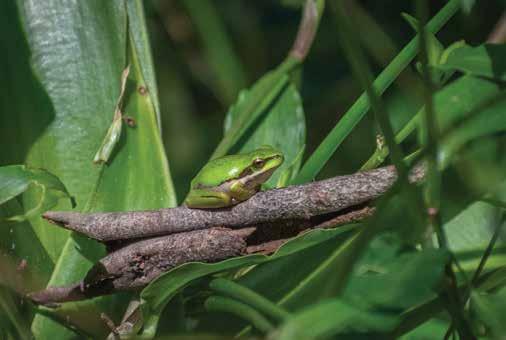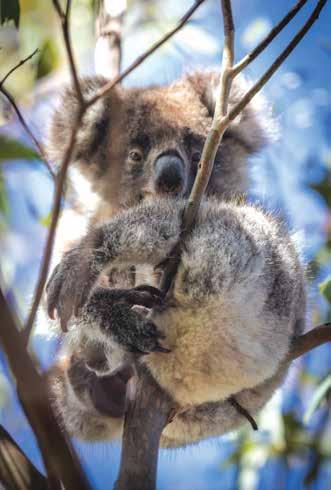
5 minute read
Negative word
Almost half of Aussie families will have post-Christmas debt A CREDIT-FUNDED
Christmas has pushed millions of Aussies into debt, according to new research.
Advertisement
A Finder survey of 1,086 respondents revealed almost half (49 percent) of Australians – equivalent to 9.8 million people – have racked up Christmas debt. The research found one in three (36 percent) will take up to five months to pay off their festive debt, while eight percent will take at least six months or more. A further four percent – equivalent to over 800,000 people – say it will take them twelve months or more to settle. Millennials went on the biggest spending spree, with two in three (71 percent) accumulating debt, compared to gen X (39 percent). Amy Bradney-George, credit card expert at Finder, said it's supposed to be the most wonderful time of the year, but for many Australians, the holiday season can also be a source of financial stress. “The expectations around buying gifts for loved ones, travelling to see family and other holiday activities can lead to overspending and more reliance on credit. “With the added financial strain from the rising costof-living, many people are finding it harder to stay within their budget and avoid falling into debt.” Bradney-George said making a budget is key to eliminating holiday season debt. “A budget helps you take stock of the money that’s coming in and going out. “Seeing your income, expenses and debts in one place can also help you prioritise your financial goals and avoid overspending. “Look for ways to trim your spending on things like dining out, entertainment, and unnecessary purchases. “Consider setting a spending limit for yourself and avoiding unnecessary purchases until you've paid off your Christmas debt.” Men overspent the most with 55 percent carrying some level of Christmas debt, compared to 43 percent of women.
Mambo Wetlands Walks return in February
By Marian SAMPSON
MAMBO Wanda Wetlands is an amazing ecological wonderland with a variety of native flora and fauna.
Mambo Walks will be happening again this February after a two year hiatus, giving the public valuable insights into the importance of this site. Irene Jones, President of the Mambo Wanda Wetlands Conservation Group said, “It’s wonderful to be back, helping people appreciate this great natural asset, right in the middle of Salamander Bay.” The walks are the first activity marking the 30 year anniversary celebrations of EcoNetwork Port Stephens.
World Wetlands Day is celebrated every year on 2 February.
“By spreading the tours over several dates and times we have been able to engage with a greater variety of speakers,” added Ms Jones.
“We have Kate and Taylar from Port Stephens Council talking about coastal vegetation.
“Trudy and Bruce Pease are experienced fisheries scientists who will take people through the wetlands at high tide to talk about the impact of increased water flows since the construction of the new bridge on Foreshore Drive.”
Renowned bird authority Neil Fraser will share his knowledge on the birds of Mambo in the comfort of the Tomaree Library, while Nigel Dique will explain why Ramsar designations are so important for wetlands all over the world.
Carol Ridgeway Bissett has supported Mambo Walks in previous years and her tours are always heavily booked.
Carol is a traditional custodian and knowledge holder of the local Maiangal people.
“She has a depth of knowledge about local animal and plant life which she so generously shares as well as educating us about the cultural significance of Mambo and Wanda wetlands,” said Ms Jones. Iain Watt, President of EcoNetwork Port Stephens and a marine scientist, will escort and guide a walking group along the foreshore to explore the exciting world of mangroves.
“Mambo Wanda Conservation Group has

q A beautiful Green Tree Frog. Photo: Matt Spillard.
q A koala on the fringes of the Mambo Wanda Wetlands. Photo: Marian Sampson.
always tried to educate the public about the significance of wetlands for shoreline protection and estuarine health,” Watt said. “I’m very pleased to be able to support one of our affiliates as we celebrate EcoNetwork’s 30 years of environmental activism in Port Stephens.”
Tours and talks have been spread over the whole of February so that everyone will have a chance to find a tour that suits them.
More information is available online through EcoNetwork’s website at http://ecops.au/mambowalks
THE National Parks Association of NSW (NPA) is urging people to have their say about the native vegetation provisions of the Local Land Services Act.
The consultation period was originally set to expire on December 19, but according to the NPA, because of pressure from conservation groups, the NSW Government has extended the consultation for the Native Vegetation Codes until January 27.
The NPA says the rollback of strong biodiversity laws has led to a thirteen-fold increase in land clearing, putting vulnerable wildlife and habitats at risk.
Danielle Ryan, a conservation campaigner for the NPA said, “I feel that if more locals are aware about this consultation, they would want to participate and share their views.”
She is urging people to inform themselves of the issues and respond to the consultation.
The NPA has a number of issues with the review and has made a series of recommendations.
It wants the current review suspended in favour of a more comprehensive review that acknowledges the impacts of the current regulations on biodiversity and adheres to principles that ensure no further species or ecosystem losses.
This would entail an immediate moratorium on large-scale land clearing and clearing of known threatened ecosystems and habitat for wildlife, pending the outcomes of the review.
The NPA asks the NSW Government separately investigates options for providing greater support for regenerative agricultural practices that enhance vegetation, biodiversity, nutrition, water cycling, soils, forests, perennial pastures and catchments.
Other recommendations include better education of involved parties, improved monitoring and greater penalties for non-compliance.
“My great grandfather was a red cedar cutter in the northern rivers, before society understood the widespread impacts of clearing native forest,” Ms Ryan said.
“I believe it is up to current generations to right a wrong - ignorance is no longer an excuse for pushing species towards extinction.”

National Parks Association urges people to have their say Ms Ryan said that to compensate for the part her family played in wiping out the highly-prized red cedar, she intends to restore a 40-hectare bush block established by her grandfather that she has coinherited. “As a private landholder, I want to see an end to largescale clearing today,” she said. “I want to restore and protect this patch of forest for my daughter and generations to come.” The NPA said it encourages the community to take advantage of the extended consultation deadline because it is a vital opportunity for the public to share their views about why they want to see biodiversity laws reformed, to protect NSW’s vulnerable wildlife and habitats for generations to come. Submissions can be emailed to policy@lls.nsw.gov. au.









